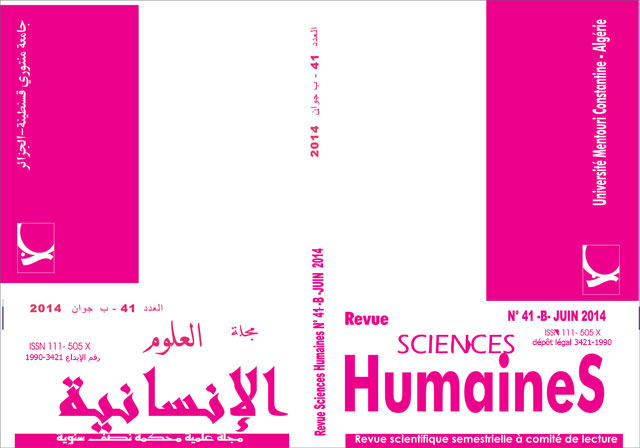The Pragmatic Suitability of the Algerian ELT Secondary School Textbooks: A Focus on Speech Acts
Abstract
This study investigates to what extent the Algerian ELT secondary school textbooks are pragmatically-suitable with regard to speech acts, with a focus on two of the most frequent ones:request and apology. The study aims at exploring the appropriacy and adequacy of the input at the pragmalinguistic level and the sociopragmaticone,the explicitness of that input and the metapragmatic information associated with it. All the requests and apologies that appear in the materialare identified, then coded and analysed. Findings show that although the textbooks provide a minimum of the linguistic forms used for the realisation of these two speech acts, they are rather limitedwhen it comes to associating them with the relevant contextual and cultural factors. The input is, on the whole, implicitly presented while there is paucity in the metapragmatic information that is necessary to guidethe learners to the best production of these two acts. In this respect, the material used is highly unlikely to provoke the acquisition of these two speech acts. It is, therefore, recommended that the syllabus designers should address these shortcomingsDownloads
References
-Bachman, L. (1990). Fundamental Consideration in Language Testing. Oxford: Oxford University Press.
-Bergman, L and Kasper, G. (1993). Perception and Performance in Native and Nonnative Apology. In Kasper and Blum-Kulka (eds) Interlanguage Pragmatics, (pp. 82-107). Oxford and New York: Oxford University Press.
-Billmyer, K. (1990). I really Like Your Lifestyle: ESL learners learning how to compliment. Penn Working Papers in Educational Linguistics (6), 31-86.
-Blum-Kulka, S., House, J. and Kasper, G. (1989). Cross-Cultural Pragmatics: Requests and Apologies. Norwood, NJ: Ablex.
-Bouton, L. (1994). Conversational Implicature in the Second Language: Learned slowly when not deliberately taught. Journal of Pragmatics (22), 157-167.
-Brown, P. and Levinson, S. (1987). Politeness: Some Universals in Language Usage. Cambrige: Cambridge University Press.
-Canale, M. and Swain, M. (1980). Theoretical Base of Communicative Approaches to Second Language Teaching and Testing. Applied Linguistics, 1 (1), 1-48.
-Celce-Murcia, M. (2007). Rethinking the Role of Communicative Competence in Language Teaching. In Alcon Solar and Safont Jorda (eds), Intercultural Language Use and Language Learning (pp. 41-57). Dordrecht (Netherland): Springer.
-Celce-Murcia, M., Dornei, Z. and Thurell, S. (1995). A Pedagogical Framework for Communicative Competence: A Pedagogically motivated Modal with content specifications. Issues in Applied Linguistics , 6 (2), 5-35.
-Cohen, A. (1998). Speech Acts. In McKay and Hornberger (eds), Sociolinguistics and Language Teaching (pp. 383-420). Cambridge: Cambridge University Press.
-Cohen, A. (1996). Investigating the Production of Speech Act Sets. In Gass and Nue (eds), Speech Acts Across Cultures: Challenges to communication in a second language (pp. 21-43). Berlin and New York: Mouton de Gruyter.
-Cohen, A. (2005). Strategies for Learning and Performing L2 Speech Acts. Intercultural Pragmatics , 2 (3), 275-301.
-Eslami-Rasekh, Z., Eslami-Rasekh, A. and Azizollah, F. (2004).The Effect of Explicit Metapragmatic Instruction on the Speech Act Awareness of Advanced EFL Students. In TESL-EJ, 2 (8), pp. 1-12.
-Kasper, G. and Schmidt, R. (1996). Developmental Issues in Interlanguage Pragmatics. Studies in Second Language Acquisition (18), 149-169.
-Kasper, G. and Blum-Kulka, S. (1993). Interlanguage Pragmatics. New York and Oxford: Oxford University Press.
-Maeshiba, N., Yoshinaga, N. and Kasper, G. (1996). Transfer and Proficiency in Interlanguage Apologising. In Gass and Nue (eds), Speech Acts Across Cultures: Challenges to communication in a second language (pp. 155-190). Berlin and New York: Mouton de Gruyter.
-Martinez-Flor, A. (2007). Analysing Request Modification Devices in Films: Implications for Pragmatic Learning Instructed Foreign Language Contexts. In Alcon Solar and Safont Jorda (eds), Intercultural Language Use and Language Learning (pp. 245-279). Dordrecht (Netherlands): Springer.
-Palmer, F. R. (1979). Modality and the English Modals. London and New York: Longman.
-Sabaté i Dalmau, M. and Curell i Gotor, H. (2007). From "Sorry very much" to "I'm ever so sorry:" Acquisitional patterns in L2 apologies by Catalan learners of English. Intercultural Pragmatics , 4 (2), 287-315.
-Salazar Campillo, P. (2007). Examining Mitigation in Requests: A Focus on Transcripts in ELT Coursebooks. In Alcon Solar and Safont Jorda (eds), Intercultural language Use and Language Learning (pp. 207-222). Dordrecht (Netherland): Springer.
-Saville-Troik, M. (1998). The Ethnography of Communication. In McKay and Hornberger (eds), Sociolinguistics and Language Teaching (pp. 351-382). Cambridge: Cambridge University Press.
-Sifianou, M. Politeness Phenomenon in England and Greece. A cross-cultural perspective.Oxford: Oxford University Press.
-Stenson, N. (1974). Induced errors. In Schumann, J. and Stenson, N. (eds.), New Frontiers in Second Language Learning. Rowley, Mass.: Newbury House.
-Trosborg, A. (1995).Interlanguage Pragmatics: Requests, Complaints and Apologies. Berlin: Mouton de Gruyter.
-Vellenga, H. (2004). Learning Pragmatics from ESL & EFL Textbooks: How Likely? TESL-EJ, 8 (2), 1-17.
Textbooks
-Arab, S. A., Bensammene, M. and Riche, B. (2006). New Prospects: Teacher's Book, Year Three. Algiers (Algeria): The National Authority for School Publications.
-Arab S. A., Riche, B. and Bensemmane, M. (2009). New Prospects: Secondary Education, Year Three. Algiers (Algeria): The National Authority for School Publications.
-Riche, B., Arab, S. A., Bensemmane, M., Ameziane, H. and Hami, H. (2011). Getting Through: Secondary Education, Year Two. Algiers (Algeria): The National Authority for School Publications.
-Riche, B., Arab, S. A., Bensemmane, M., Ameziane, H. and Hami, H. (2006). Getting Through: Teacher's Book, Year Two. Algiers (Algeria): The National Authority for School Publications.
-Riche, B., Arab, S. A., Hami, H., Amezian, H. and Louadj, K. (2006). At The Crossroads: Teacher's Book, Year One. Algiers (Algeria): The National Authority for School Publications.
-Riche, B., Arab, S. A., Hami, H., Amezian, H. and Louadj, K. (2010). At The Crossroads: Secondary Education, Year One. Algiers (Algeria): The National Authority for School Publications.
















